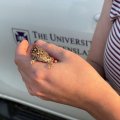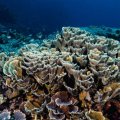The University of Queensland has paid tribute to its emerging research leaders, awarding more than $800,000 at the annual UQ Foundation Research Excellence Awards tonight (September 23).
Eleven researchers were honoured for their work, which covered projects as diverse as helping older couples deal with dementia through music to using sunlight to purify water.
In addition, three UQ academics were honoured with Awards for Excellence in Research Higher Degree Supervision, each worth $10,000. These awards reward those who help foster the next generation of researchers. Two people were also commended for their work as supervisors with Meritorious Research Higher Degree Supervision Certificates.
This year marked the 10th anniversary of the UQ Foundation Research Excellence Awards, which were launched in 1999 and were the first of their kind in Australia.
Deputy Vice-Chancellor (Research) Professor David Siddle said it was a mark of the quality of the recipients that previous award winners had gone on to make significant contributions, with a number of them receiving Australia’s most prestigious scientific appointments.
“Almost one-third of ARC Federation Fellows at UQ were previous UQ Foundation Research Excellence Awards winners,” Professor Siddle said.
Professor Christa Critchley, Dean of the UQ Graduate School, praised the three winners of the Awards of Excellence in Research Higher Degree Supervision.
“I congratulate our Awardees for their sustained contribution to excellence in research supervision,” Professor Critchley said.
“Supervisors play a crucial role in developing and supporting early career researchers at a formative time in their careers.
“Their guidance and advice is key to producing the next generation of quality researchers.”
The 2008 UQ Foundation Research Excellence Award winners are:
Dr Felicity Baker ($70,000) – School of Music
Dr Baker is investigating how music therapy might help, husbands, wives and partners who care for a partner with dementia, by providing opportunities for the sharing of memories associated with certain songs. The project will involve having a music therapist show a spouse how he or she can use music as a way of creating meaningful experiences with the partner. The work will help caregivers maintain a satisfying relationship, while decreasing anxiety and depression.
Dr Brett Collins ($85,000) – Institute for Molecular Bioscience
Dr Collins is investigating how material coming into and out of cells is sorted, thus providing information that will improve our understanding of diseases such as cancer. As well as providing a basic understanding of fundamental cellular processes, the molecular details generated from this work will lay the foundation for future efforts to design drugs that target specific pathways in and out of cells.
Dr David Copland ($80,000) – School of Health & Rehabilitation Science
Dr Copland will look at how language impairment following stroke causes considerable frustration and distress for the individual and their family and friends. These problems can be alleviated through language treatment, but it isn’t known how the brain recovers language and therapy is not always effective. The study will use state-of-the-art brain imaging techniques to better understand the brain mechanisms underpinning successful language treatment following stroke.
Dr Elizabeth Coulson ($80,000) – Queensland Brain Institute
Dr Coulson is working on ways to reduce neuron loss in the brains of people with Alzheimer’s disease. Neurons are nerve cells that transmit signals to and from the brain and the research will study what makes healthy nerve cells switch off and die, a characteristic associated with many neurodegenerative conditions. Dr Coulson’s research is focusing on a particular molecule that is associated with nerve cell death.
Dr Brad Launikonis ($90,000) – School of Biomedical Sciences
Dr Launikonis is researching the way calcium moves in muscle fibres to regulate muscle function. The work could lead to treatments for debilitating conditions such as muscular dystrophy. Understanding how muscles work at the cell level is essential if effective treatments for muscle disorders are to be developed. The research will also benefit diverse groups such as athletes wishing to understand how muscles fatigue, to people dealing with muscle degeneration resulting from ageing.
Dr Dustin Marshall ($75,000) – School of Integrative Biology
Dr Marshall is using the humble sea squirt to look at how marine animals adapt to pollution. Dr Marshall will examine how events such as freshwater runoff affect the evolution of these organisms under field conditions, a first for marine research. By monitoring changes in growth rate and their resistance to other stresses, he will examine whether sea squirts evolve to develop a tolerance to pollution.
Dr Greg Marston ($60,000) – School of Social Work & Human Services
Dr Marston is investigating the financial lending practices of Australia’s fringe-economy and consumer experiences of accessing these services. He defines the fringe-economy as financial services that target low-income people, businesses such as pay-day lenders, pawn shops and sub-prime mortgage services. The project aims to profile the users of fringe financial services, including socio-demographic characteristics and patterns of use.
Dr Ben Powell ($75,000) – School of Physical Sciences
Dr Powell’s project aims to provide a greater understanding of the behaviour of electrons in organic superconductors. Superconductors conduct electricity without resistance and are used in magnetic resonance imaging, high-speed magnetic levitation trains and particle accelerators. Organic superconductors are more appealing than their ceramic and metallic counterparts as they have greater potential for the fine-tuning of electrical properties. Dr Powell’s research will use a technique called neutron scattering, which allows him to see fine details of organic superconductors.
Dr Shizhang Qiao ($80,000) – Australian Institute for Biotechnology and Nanotechnology
Dr Qiao’s project aims to develop a new technology to reduce the cost of producing drugs. By investigating the unique magnetic properties and structure of silica nanoparticles, Dr Qiao will discover how they self assemble. Harnessing these properties will have significant implications for drug manufacture and delivery.
Dr Andreas Schloenhardt ($50,000) – TC Beirne School of Law
Dr Schloenhardt’s project will provide the first comprehensive and comparative analysis of sexual exploitation and other forms of forced labour of foreigners in Australia and Canada, especially in the sex industry. It will identify and analyse cases of human trafficking and other forms of sexual exploitation, especially of women and children. While bringing greater public attention to the problem, the project will also suggest measures for policy makers to confront the problem more effectively.
Dr Lianzhou Wang ($75,000) – School of Engineering
Dr Lianzhou Wang’s project is looking at a new type of efficient photocatalyst that can drive wastewater purification using the power of the sun. Photocatalysts are substances that absorbs light and, in doing so, catalyse reactions. The research will lead to possible breakthrough technologies such as cost-effective water purification, photovoltaic cells, anti-bacterial coating and water splitting for hydrogen production.
The winners of the Awards for Excellence in Research Higher Degree Supervision are:
Professor Michael Jennings, from the School of Molecular & Microbial Sciences Professor Bruce Murdoch, from the School of Health & Rehabilitation Sciences Professor Halina Rubinsztein-Dunlop, from the School of Physical Sciences
The winners of the Meritorious Research Higher Degree Supervision Certificate are:
Associate Professor Michael Emmison, from the School of Social Science Professor Paul Hodges, from the School of Health & Rehabilitation Sciences
Speeches from the awards ceremony, including guest speaker Robyn Williams, an Adjunct Professor with UQ’s School of Journalism and Communication and host of ABC Radio National’s Science Show, can be found here.
Media: Andrew Dunne (3365 2802 or 0433 364 181). High-resolution images of all winners are available by contacting Diana Lilley (3365 2753 or email d.lilley@uq.edu.au).


